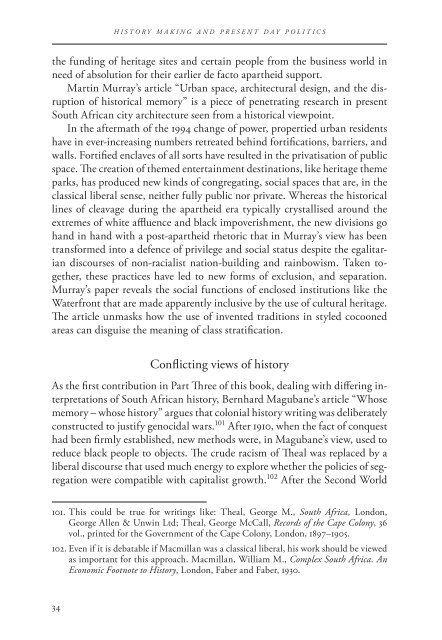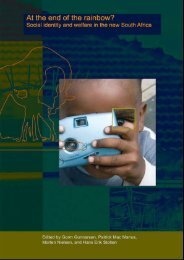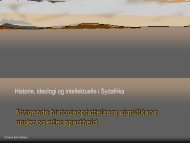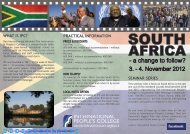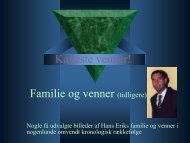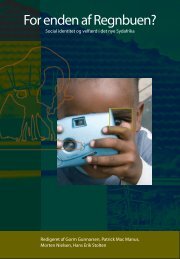History Making and Present Day Politics - Stolten's African Studies ...
History Making and Present Day Politics - Stolten's African Studies ...
History Making and Present Day Politics - Stolten's African Studies ...
Create successful ePaper yourself
Turn your PDF publications into a flip-book with our unique Google optimized e-Paper software.
h i s t o r y m a k i n g a n d p r e s e n t d a y p o l i t i c s<br />
the funding of heritage sites <strong>and</strong> certain people from the business world in<br />
need of absolution for their earlier de facto apartheid support.<br />
Martin Murray’s article “Urban space, architectural design, <strong>and</strong> the disruption<br />
of historical memory” is a piece of penetrating research in present<br />
South <strong>African</strong> city architecture seen from a historical viewpoint.<br />
In the aftermath of the 1994 change of power, propertied urban residents<br />
have in ever-increasing numbers retreated behind fortifications, barriers, <strong>and</strong><br />
walls. Fortified enclaves of all sorts have resulted in the privatisation of public<br />
space. The creation of themed entertainment destinations, like heritage theme<br />
parks, has produced new kinds of congregating, social spaces that are, in the<br />
classical liberal sense, neither fully public nor private. Whereas the historical<br />
lines of cleavage during the apartheid era typically crystallised around the<br />
extremes of white affluence <strong>and</strong> black impoverishment, the new divisions go<br />
h<strong>and</strong> in h<strong>and</strong> with a post-apartheid rhetoric that in Murray’s view has been<br />
transformed into a defence of privilege <strong>and</strong> social status despite the egalitarian<br />
discourses of non-racialist nation-building <strong>and</strong> rainbowism. Taken together,<br />
these practices have led to new forms of exclusion, <strong>and</strong> separation.<br />
Murray’s paper reveals the social functions of enclosed institutions like the<br />
Waterfront that are made apparently inclusive by the use of cultural heritage.<br />
The article unmasks how the use of invented traditions in styled cocooned<br />
areas can disguise the meaning of class stratification.<br />
Conflicting views of history<br />
As the first contribution in Part Three of this book, dealing with differing interpretations<br />
of South <strong>African</strong> history, Bernhard Magubane’s article “Whose<br />
memory – whose history” argues that colonial history writing was deliberately<br />
constructed to justify genocidal wars. 101 After 1910, when the fact of conquest<br />
had been firmly established, new methods were, in Magubane’s view, used to<br />
reduce black people to objects. The crude racism of Theal was replaced by a<br />
liberal discourse that used much energy to explore whether the policies of segregation<br />
were compatible with capitalist growth. 102 After the Second World<br />
101. This could be true for writings like: Theal, George M., South Africa, London,<br />
George Allen & Unwin Ltd; Theal, George McCall, Records of the Cape Colony, 36<br />
vol., printed for the Government of the Cape Colony, London, 1897–1905.<br />
102. Even if it is debatable if Macmillan was a classical liberal, his work should be viewed<br />
as important for this approach. Macmillan, William M., Complex South Africa. An<br />
Economic Footnote to <strong>History</strong>, London, Faber <strong>and</strong> Faber, 1930.<br />
34


